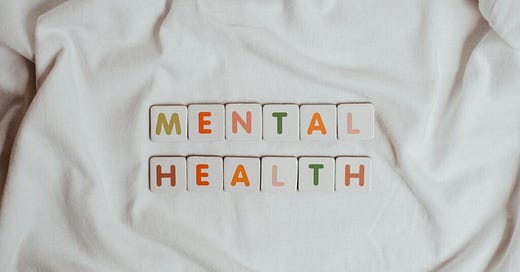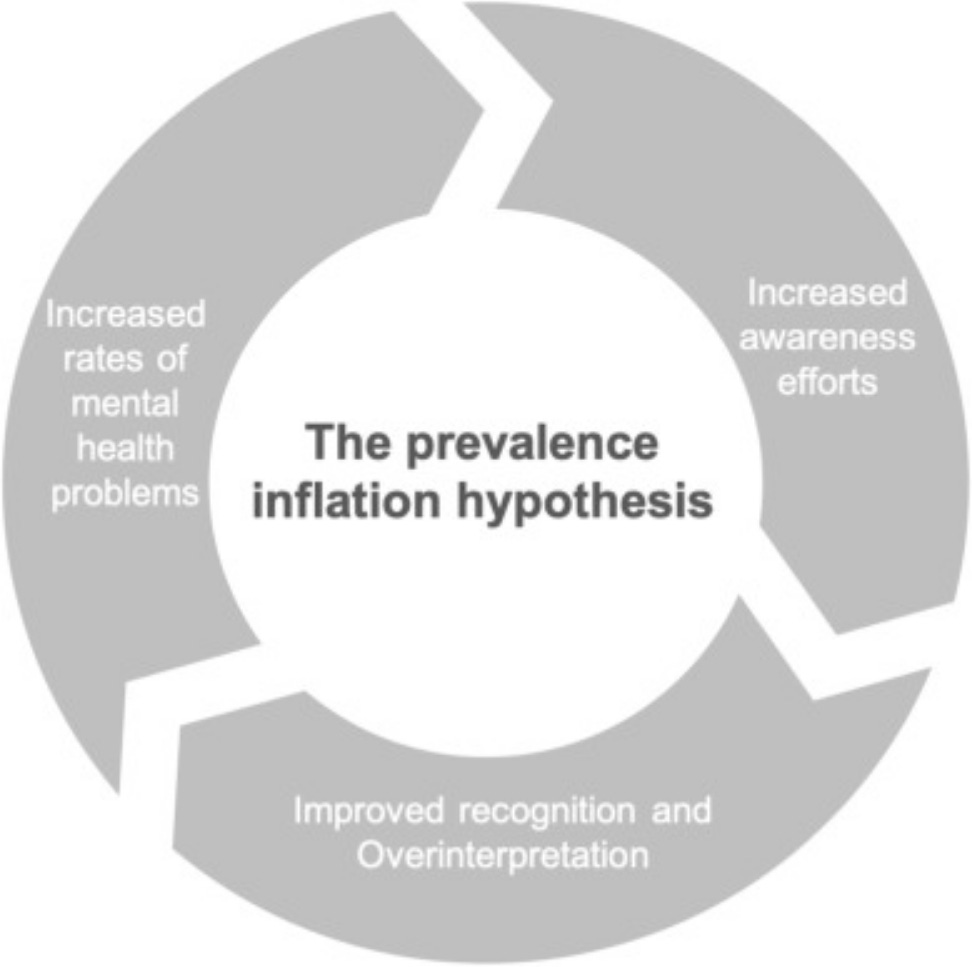I published last week's post, The depression misconception, with some trepidation. In a society that has been steeped in the narrative of 'depression-as-mental-illness', labelling depression as 'failure feedback', and raising the possibility that it is actually a functional, adaptive response to significant failure, can come off as judgmental, victim-blaming, or just flat-out wrong.
I was pleasantly surprised by the universally positive feedback to this post. There were so many thoughtful comments, both from readers who recounted their personal experiences, and those who had observed the negative impact of diagnosis of depression-as-mental-illness on friends and family members; if you haven't already, I urge you to read them all.
The way in which this framing of depression as failure feedback resonated with my readers, prompted me to dig deeper into the topic of "mental health" - a term that I've detested for a long time, without ever fully articulating why it rankles me so intensely.
It's easy to lose sight of how profoundly the modern "mental health" movement has altered our perspectives on the causes of human suffering, and how best to alleviate it.
In 1843, William Sweetser, MD published Mental hygiene, or, An examination of the intellect and passions: designed to illustrate their influence on health and the duration of life, in which he catalogued the detrimental effect of unbridled emotions ("passions") on individual health, happiness, and success, and on the broader society. Sweetser stressed the importance of learning to control one's emotions, using one's intellect:
"Having reference only to the laws of our present organization, it seems to me that no truth can be more plain than that pure and well regulated moral affections [emotions] are essential to the greatest good of the entire animal economy,- that the turbulent and evil passions must necessarily corrupt the sources of our physical, moral and intellectual health, and thus be followed by the severest penalties to our whole nature.
'He', says an old medical writer, 'who seriously resolves to preserve his health, must previously learn to conquer his passions, and keep them in absolute subjection to reason; for, let a man be ever so temperate in his diet, and regular in his exercise, yet still some unhappy passions, if indulged to excess, will prevail over all his regularity, and prevent the good effects of his temperance.'"
To Sweetser and other proponents of "mental hygiene", it was the responsibility of the individual to practise emotional self-regulation, and the paramount duty of parents to train their children in this discipline from the earliest age.
But by the mid-19th century, advocates of public health began to advance the concept of "mental health" as inextricably linked with their movement. And, as I pointed out in Your doctor is not your doctor, "public health" is incontestably collectivist - that is, it is focused on actions and policies that serve "the greater good" rather than the individual. (Conversely, medicine, both orthodox and 'alternative', is focused on optimising health outcomes for individuals.)
The leaders of the public health movement framed both the physical and mental health of individuals as being an issue of vital interest to the state, since both physical infirmity and "mental illness" - manifesting as aberrant and/or antisocial behaviour - would reduce that individual's utility to the state. A draft for a Public Health Law submitted to the Berlin Society of Physicians and Surgeons in 1849, stated that one of the principal objectives of public health was promoting "the healthy mental and physical development of the citizen". Not the individual, you'll note, but the citizen.
According to the Merriam-Webster dictionary, a citizen is a "person who owes allegiance to a government and is entitled to protection from it". Public health advocates held that the government had an obligation to provide for the needs of its citizens - adequate housing, a hygienic food and water supply, safe working conditions, and the type of education most likely to inculcate a strong work ethic and civic-mindedness - so that citizens could fulfil their obligations to the government, like paying taxes and sacrificing themselves in the perpetual wars provoked by their rulers.
In the aftermath of World War II, nationalistic fervour - which had been whipped up in order to fuel the carnage of that bloody chapter of human history - came to be viewed with deep suspicion. While 19th century public health advocates had urged governments of individual states to take steps to support the "healthy mental development" of their citizens out of enlightened self-interest, their mid-20th century counterparts now construed "mental health" as a vehicle for inculcating a new, internationalist ethic.
The First International Congress of Mental Health was held in London in 1948. The theme of the conference was "Mental Health and World Citizenship". However, "discussions over world citizenship prevailed over those on mental health." During the conference,
"Tensions [arose] between a pragmatic approach, developed by the mental hygiene movement (basically defended by delegates from the USA), and a more politically-oriented approach, proposed by other participants, perhaps translating the experiences of some delegates from European countries, which had severely suffered from the war. In the end this latter approach prevailed, with the transformation of the mental hygiene movement into the mental health movement. Perhaps as a reflection of this basically political movement, in 1949 the National Institute of Mental Health started its activities in the USA."
To put it bluntly, the "mental health movement" was, from its inception, a tool of globalists. The mental hygiene movement had stressed individual and parental responsibility for emotional self-regulation. The takeover and transformation of this movement into the "politically-oriented" mental health movement, which explicitly aimed to transform the way that ordinary people viewed themselves and their world, was a key plank of the globalist project.
In the mid-20th century, the chief aim of the new globalist mental health movement was to break down old allegiances to nation-states, and inure the masses to the notion of "world citizenship".
What is the chief project of the 21st century mental health movement? Judging by its preoccupations, it is to infantilise, to atomise, to pathologise the normal and normalise the pathological, and to feminise.
In place of Sweetser's stern admonition to parents to train their children to use their intellect to regulate their emotions from a young age, we now live in an era in which a not inconsiderable number of people are, somehow, not ashamed to behave like this in public places:
In place of Sweetser's observation that "well regulated moral affections are essential to the greatest good of the entire animal economy", we have professional protesters (funded, in part, by an oil heiress) blocking the path of an ambulance transporting a patient in urgent need of medical care, as they shut down traffic on a major road in order to foist their "climate catastrophe" narrative onto the public:
... and one of the top medical journals in the world urging doctors to recruit patients to become climate activists, on the pretext that their illnesses are a direct consequence of "climate sensitive health hazards".
In place of Sweetser's recognition that emotional distress is an integral part of the human condition, which we need to learn how to manage if we are to live happy and productive lives, we now have multiple generations who, thanks to "awareness campaigns", have been raised to overinterpret every emotional fluctuation as a diagnostic indicator of mental illness.
And conversely, school students are commanded to simply accept a classmate who self-identifies as a cat, on pain of being accused of being "homophobic" and "despicable", and belonging in an asylum.
Finally, in place of Sweetser's respect for the Spartans' tough love childrearing practices, we've been told for decades now that boys' and men's problem-solving strategies and hierarchy-driven leadership styles are manifestations of "toxic masculinity", and that they should adopt stereotypically feminine practices of endless discussion, consensus-building and flat management structures instead.
The result is, to put it mildly, a hot mess. After decades of campaigns to raise awareness of "mental health" issues, and to increase access to prevention, early intervention and treatment programs, we now have more young people being diagnosed with so-called mental health disorders than ever before - nearly 40 per cent of Australians aged 16 to 24.
Why has the relentless focus on "mental health" produced such dismal outcomes? As two researchers from the University of Oxford and the University of New South Wales put it in a 2023 paper,
"Awareness efforts are leading some individuals to unnecessarily consider milder or more transient psychological difficulties as mental health problems that require labelling, reporting and treating – i.e. problems of living that were not previously considered mental health problems, and still should not be...
... Awareness efforts arguably encourage overinterpretation. Some campaigns specifically encourage individuals to notice, label, and seek help for negative psychological experiences, and promote the use of psychiatric terminology (for example, the World Health Organisation's ‘Depression: Let's talk’ campaign in 2017; Rethink's ‘From psychosis to … ’ campaign in 2022) (Henderson et al., 2017; Rethink. Urgent campaign launches to, 2022; Thornicroft et al., 2016; World Health Organisation, 2017). Campaigns might therefore be actively contributing to the so-called ‘psychiatrisation’ of everyday suffering and distress that has become increasingly common in recent years (Brinkmann, 2014). Other campaigns promote the idea that disclosing one's mental health problems in this way is brave and admirable (Kosyluk et al., 2021; Rochlen et al., 2005). These are important messages, since shame and stigma remain significant barriers to help-seeking (Ali et al., 2020; Clement et al., 2015; Eigenhuis et al., 2021). However, these messages also mean that interpreting and describing one's difficulties as a mental health problem might now have social value and therefore be desirable for some individuals. This could explain why mental health problems are now sometimes glamorised or romanticised, particularly on social media (e.g. quotes about depression on aesthetically-appealing backgrounds are widely shared); this phenomenon has been highlighted by a number of cultural commentators (Bine, 2013; Jadayel et al., 2017; Rick, 2016; Williams, 2019). Considering these factors, we hypothesise that awareness efforts may be leading to an increased and excessive tendency to interpret negative psychological experiences as mental health problems.
Furthermore, we hypothesise that overinterpretation creates new mental health problems, or increases the severity of existing ones. A number of academics have theorised that, when an individual interprets and labels their psychological experiences as a mental health problem, this can bring these symptoms into existence in a manner of a self-fulfilling prophecy."
The authors go on to catalogue some of the disastrous outcomes of programs that were intended to prevent "mental health" disorders:
Psychological debriefing, a form of brief group therapy delivered after a traumatic event, was shown in two randomised controlled trials to increase symptoms of post-traumatic stress disorder compared to no psychological treatment.
School-based interventions teaching cognitive behavioural therapy (CBT) principles led to increased internalising symptoms such as sadness, anxiety, loneliness and withdrawal.
Another school-based CBT program, designed to prevent depression, caused low mood and more negative thinking in some participants. Participants reported that "trying to identify negative thoughts in class made them feel low, even when they had initially felt positive".
School-based mindfulness lessons produced more depressive symptoms in adolescents who were considered at risk of mental health problems before the intervention.
Internet-based CBT programs cause symptom deterioration in some adults, who "report that the therapy made them feel worse because of the insight it offered into their difficulties".
(Another paper, not included in this article, found that a school-based dialectical behaviour therapy [DBT] program increased symptoms of anxiety and depression, and worsened parent-child relationships.)
The authors propose that all the efforts to raise awareness of "mental health" problems have led to prevalence inflation, a vicious circle in which banging on endlessly about what a terrible scourge poor mental health is today, especially among young people, leads to more people believing that they have a mental health problem, and then altering their self-concept and behaviour in ways that exacerbate their symptoms and the resultant distress:
So what should we do about the "mental health crisis" that has been, to a large extent, generated by the "mental health movement" and its interminable awareness campaigns and counterproductive interventions?
As I hinted in the deliberately provocative title of this post, a good start would be to stop feckin' talking about mental health. I don't mean, of course, that we should all adopt a stiff upper lip and pretend that we don't ever experience any psychological distress.
Every human being on planet Earth has suffered sadness, anxiety, disappointment, loneliness, heartbreak, envy, and anger. Most of us have had at least one episode of depression, after a particularly devastating failure or loss. But these painful experiences are not "mental health problems", let alone "mental illness". They're normal and inevitable aspects of the human condition.
As I recently explained to my young adult son, who is struggling to make friends in a university filled with students who never look up from their devices, loneliness is meant to feel bad. It's the awfulness of the experience that motivates us to get off our behinds and go out to places where people actually want to meet and interact with other human beings (what a concept).
And as I, also recently, told my daughter, the despondency that she is currently grappling with as she tries to figure out her direction in life is also meant to feel bad. That's the motivation to get out of her current rut, and try something new!
Our emotions are signalling systems that notify us when we're moving in the right, or wrong direction, like the children's game of Hot and Cold. Excitement, joy and satisfaction tell us "that's good, do more of that". Sadness, boredom and disappointment tell us "that's bad, move away from that". Loneliness tells us "you need more company - go out and find some". Anger tells us "that person is infringing on your interests - stand up for yourself!"
You don't have a "mental health" problem because you're experiencing more unpleasant than pleasant emotions. You have a life problem. Or perhaps several life problems. And the way to solve them is not to seek a "mental health" diagnosis and submit to psychiatric “treatment” for it, but, as discussed in last week's post, to conduct a forensic analysis of those problems - if necessary, with the assistance of a well-grounded friend, or a professional who does not seek to pathologise you - and to develop and implement a plan to overcome them.
I'll leave you with one of my favourite comments left on last week's article, which contains some sage advice that's not just relevant to resolving depression:
As always, I look forward to reading your thoughts and reflections:
And finally, this post has taken me approximately 10 hours to research and write. I make all my posts freely available to all readers, because I believe we all deserve access to information that helps us to take greater control over our health. But I rely on my small core of paid subscribers to provide this service to those who genuinely can’t afford it.







Accurate and enjoyable to read as well. Before the grand scale hoax of COVID-19, I used to trust GPs' advice. Not anymore. My health was ruined by unnecessary use of antidepressants, statins, and proton pump inhibitors. [https://unbekoming.substack.com/p/heresy]
Ooooh!, so much good stuff here Robyn as always!
The following totally blew my mind, I had no idea! "To put it bluntly, the "mental health movement" was, from its inception, a tool of globalists... which explicitly aimed to transform the way that ordinary people viewed themselves and their world, was a key plank of the globalist project". Wow!
And this was brilliant: "What is the chief project of the 21st century mental health movement? Judging by its preoccupations, it is to infantilise, to atomise, to pathologise the normal and normalise the pathological, and to feminise."
Once again, it all comes back to disempowerment and trust the experts. People rush to mental health professionals with problems and friends and families are too scared to say anything or offer counsel because it might be the wrong thing and "I'm no expert". Witness how after every disaster of some sort, there's an outcry of "I don't know how to talk to my kids about this!" and we need to rush experts in from everywhere to help. (Most recently the Bondi junction stabbings).
It reminds me of The Quarterly Essay "Lifeboat - Disability, Humanity and the NDIS" by Micheline. She relates anecdotes of people with disabilities seeking assistance in public being met with "Where's your carer?", rather than immediately receiving help. One perverse outcome of the NDIS.
The other issue is the resultant trivialising and marginalising of people with severe mental conditions. Eleanor de Jong makes this point in "Nobody I’ve been locked up with in a psychiatric hospital felt ‘proud’ of their illness" Eleanor de Jong" (https://www.theguardian.com/commentisfree/2023/jun/19/nobody-ive-ever-been-locked-up-with-in-a-psychiatric-hospital-felt-proud-of-their-illnesses) For example "We certainly never called our illnesses or symptoms “superpowers”. If we had, no doubt our anti-psychotics would have been increased or our courtyard privileges quashed" and "The pointy end of mental illness is not photogenic or particularly quotable. It’s desperate and it’s sad, and all people want is to get off the ward and live a normal life". (Many parallels with the "neurodivergent movement" here too).
Not to mention that despite all this "awareness raising" , "studies from around the globe have found plateaux or increases in stigma against those with severe mental illnesses, especially illnesses with psychotic features" (de Jong).
I really detest "awareness raising" of physical and mental health conditions. I mean, it makes no sense for everyone to develop awareness of every health and medical condition under the sun ... for some time I've thought focusing on compassion would be much better. Meet anyone suffering and struggling with compassion. You don't need to have detailed awareness of whatever their condition or challenge is, you just need compassion and to genuinely listen.